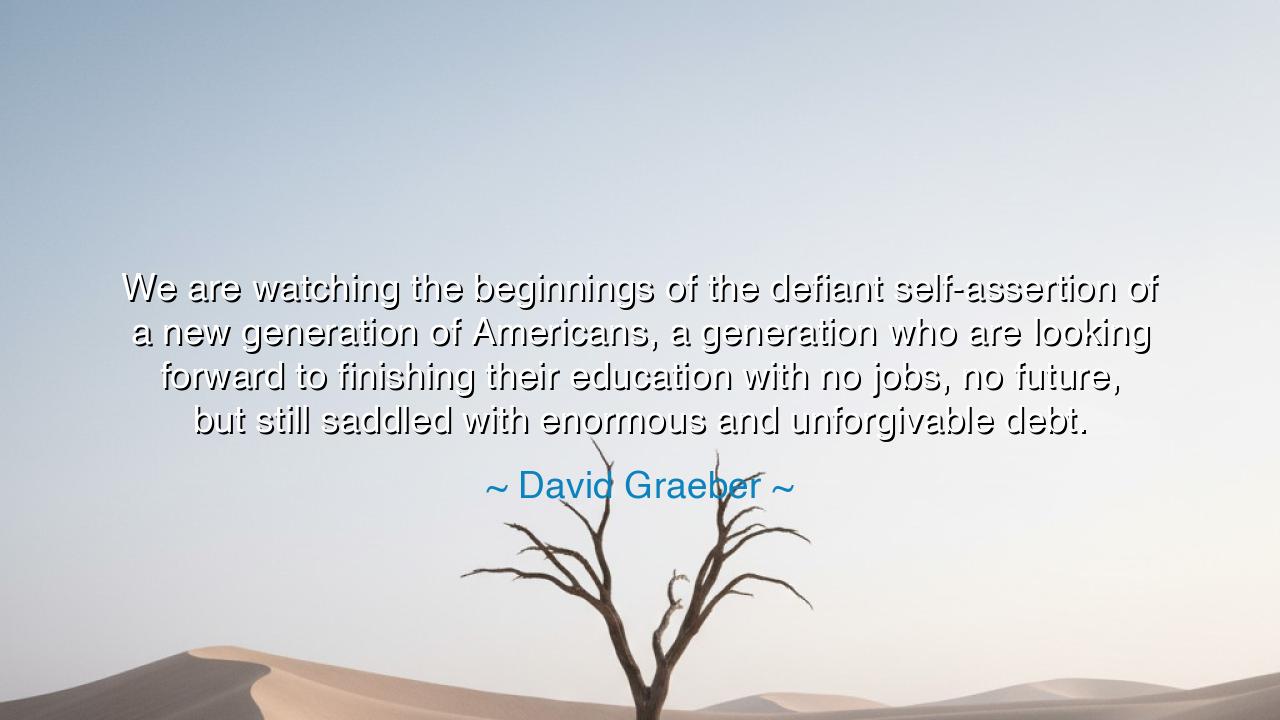
We are watching the beginnings of the defiant self-assertion of a
We are watching the beginnings of the defiant self-assertion of a new generation of Americans, a generation who are looking forward to finishing their education with no jobs, no future, but still saddled with enormous and unforgivable debt.






In the unfolding drama of modern society, there are moments when a generation, burdened by unseen chains, begins to awaken and take notice of the oppression that surrounds it. David Graeber's words, "We are watching the beginnings of the defiant self-assertion of a new generation of Americans, a generation who are looking forward to finishing their education with no jobs, no future, but still saddled with enormous and unforgivable debt," strike with the force of a truth long ignored. His observation is not just a lament but a call to attention—a recognition that the current generation faces a paradox of being told to dream big, while simultaneously being shackled by unbearable expectations and a future that offers little in return. It is a cry for justice, a plea for those burdened by debt and unfulfilled promises to finally see and claim their own power.
In the ancient world, the tension between youth and the established order was ever-present. Socrates, the great Greek philosopher, often questioned the authority of the older generation and the values they passed down, arguing that true wisdom could not be inherited blindly. Plato, his most famous disciple, wrote about the philosopher king—the wise ruler who would rise above the corruption of the traditional social structures. But the Greek youth, as depicted in Socrates’ dialogues, were not content to simply inherit their elders’ worldviews. They sought to challenge the system, questioning the very institutions that claimed to offer stability and purpose. Like Graeber’s modern youth, the ancient youth stood at the precipice of a new world, disillusioned by the promises made by their forebears.
The story of Caius Marius, a Roman general, is a vivid illustration of the generational clash that defined the Roman Republic. Marius, born into a modest family, rose to prominence through military service and political maneuvering, challenging the establishment and opening paths for commoners to rise in Roman society. He confronted the deeply entrenched patrician class, which controlled the government, by reforming the Roman army to allow landless men to enlist. Marius’s reforms were seen by many as a betrayal of the old ways, but they also gave rise to a new generation that redefined what was possible for the people of Rome. In this story, we see the ancient seeds of Graeber’s observation: a generation breaking free from the constraints of the old world, seeking to define its own future, even if it meant challenging entrenched power.
This clash of generations is a theme that has echoed throughout history. The French Revolution stands as a monumental example. The youth of France, burdened by a rigid social structure, enormous national debt, and the failure of the monarchy to address the grievances of the people, rose in defiance. Their voices, once ignored, ignited a revolution that dismantled centuries of entrenched privilege and reshaped the very foundations of society. The debt of the ancien régime, which had crippled the nation, became a symbol of the injustice that the new generation sought to overthrow. Graeber’s modern youth, like the revolutionaries of France, are struggling against the weight of a debt that has been handed down to them, and the future that feels increasingly out of reach.
Graeber’s quote is both a diagnosis and a warning. The youth of today, struggling with crushing student debt, uncertain job markets, and an uncertain future, face a world where their education has not led to opportunity but to a burden. In ancient times, a generation in such circumstances would have either turned to rebellion or revolution, seeking to overthrow the old order and replace it with something new and more just. The youth of today, it seems, are at a similar crossroads, unsure of whether to accept the weight of their situation or fight against it. Graeber’s words call for an awakening, a self-assertion that is not just about individual survival, but about dismantling the systems that have created this unsustainable future.
The lesson we must take from Graeber’s words is one of empowerment and reflection. We must recognize that the debt we face, whether financial, social, or emotional, is not just a personal burden but a reflection of a larger societal failure. Just as Socrates and Plato challenged the systems of their time, so too must we be willing to confront the structures that have failed the generations of today. We must also question the narratives that tell us that our worth is tied to material success, that the weight of our existence is to carry the burden of debt without the promise of a fulfilling future. Empowerment comes when we refuse to accept the conditions handed to us without change.
In our own lives, we must seek to understand that the future is not predetermined. Education, ambition, and critical thinking are the tools by which we can reclaim the promise of a future that serves us all. Socrates once said that “the unexamined life is not worth living,” reminding us that we must not accept the status quo, but challenge it. Just as the youth of Rome and France sought liberation, so too must we assert our right to a future that honors our potential. In the face of debt and uncertainty, we must find the strength to question and to act, to break the chains that limit our opportunities, and to create a world that is built on justice and equity for future generations.






AAdministratorAdministrator
Welcome, honored guests. Please leave a comment, we will respond soon